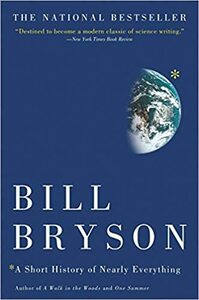Take a photo of a barcode or cover
I am 24-hour woke after reading this. I'll see you on Jeopardy.
Three takeaways:
History's greatest minds were odd ducks.
Whether it was those who discovered gravity, dinosaurs or the stars in space, it seems like these transcendent minds all had some sort of quirk. Some were sociopathic nutcases, some dedicated their lives to something trivial like earthworms, some just wanted to watch the world burn.
It's a good lesson to let kids play in the sandbox. Dabble about in your joys and something brilliant might come of it.
Genius is nothing without communication skills.
As a writer, I was amazed at the amount of truly groundbreaking ideas that were passed over because the scientific journals were unintelligible.
Thankfully, some ideas made it through the menagerie and are guiding principles of physics, chemistry, biology, etc. I can't help but wonder what else we lost because someone bored readers to tears while proposing a working time machine.
I read about clinical research and trials all the time, and they are a drag. There are no qualifications to any of it: We found X by doing Y. It led to Z. OK. BUT DOES THIS CHANGE MY WORLDVIEW?
Bill Bryson understood the assignment and delivered.
We're a miracle.
The odds of you being alive and reading this right now is so astronomical, I can't even wrap my head around it. Life is the ultimate jackpot.
On the flipside, we are also the worst. Dinosaurs lived on this amazing planet for 165 million years, where every lifeform sustained and was sustained by the Earth. A perfect cycle. Meanwhile, despite our advances, modern humans might not make it to half a million.
Knowledge is power-perhaps the worst kind.
Three takeaways:
History's greatest minds were odd ducks.
Whether it was those who discovered gravity, dinosaurs or the stars in space, it seems like these transcendent minds all had some sort of quirk. Some were sociopathic nutcases, some dedicated their lives to something trivial like earthworms, some just wanted to watch the world burn.
It's a good lesson to let kids play in the sandbox. Dabble about in your joys and something brilliant might come of it.
Genius is nothing without communication skills.
As a writer, I was amazed at the amount of truly groundbreaking ideas that were passed over because the scientific journals were unintelligible.
Thankfully, some ideas made it through the menagerie and are guiding principles of physics, chemistry, biology, etc. I can't help but wonder what else we lost because someone bored readers to tears while proposing a working time machine.
I read about clinical research and trials all the time, and they are a drag. There are no qualifications to any of it: We found X by doing Y. It led to Z. OK. BUT DOES THIS CHANGE MY WORLDVIEW?
Bill Bryson understood the assignment and delivered.
We're a miracle.
The odds of you being alive and reading this right now is so astronomical, I can't even wrap my head around it. Life is the ultimate jackpot.
On the flipside, we are also the worst. Dinosaurs lived on this amazing planet for 165 million years, where every lifeform sustained and was sustained by the Earth. A perfect cycle. Meanwhile, despite our advances, modern humans might not make it to half a million.
Knowledge is power-perhaps the worst kind.
informative
medium-paced
A great overview of a variety of topics! While this book is now a little dated and could use some updates, I still enjoyed it. Bryson does a phenomenal job of explaining complex concepts in a clear, easy, and sometimes funny, manner. I think I would have enjoyed some college courses more if he was the author of those textbooks! Definitely revived my fear of the ocean, viruses, and extinction events. Great read for anyone with no prior knowledge!
Learned a lot, really enjoyed reading it, very funny, though Bill Bryson was a bit fear-mongering. Yes, all of these really terrible things can happen to our earth and the human race and we shouldn't just ignore it, but if we worry too much about it, we would never leave our houses.
In "A Short History of Nearly Everything," Bill Bryson wields his trademark humorous brevity with professional skill. He sketches brief vignettes of biology, astronomy, taxonomy, geology, physics, mathematics, paleontology, archeology, anthropology, astrophysics, quantum mechanics, chemistry, history, and more. While he's quick to acknowledge that his Short History comes nowhere close to "nearly everything," it certainly feels like it. The breadth of this book is amazing.
Although the material is often slightly outdated, "A Short History of Nearly Everything" represents the single most accessible introduction to science I can imagine. Some may see its inaccuracies (and there are more than a few) as drawbacks, I found them to be tantalizing, open-ended clauses that beckoned future students to close them. To quickly illustrate this, let me share an example. Toward the end of the book, Bryson claims that thinking about sex can make a man's beard grow faster. He states that the mere thought of sex produces testosterone, which promotes beard growth. I immediately put the book down and sought answers from databases considerably more scholarly than a mass market paperback. Two studies conducted in 2021 and 2011 found that not only does thinking about sex have no impact on the testosterone levels in men, but beard growth is also independent of the hormone. Put simply, there is no relationship between testosterone, beard growth, and sexual thinking.
Mistakes aside, this book was fantastic. I was thrilled to find his chapters on chemistry and physics closely aligned with my all-time favorite book, "The Making of the Atomic Bomb." That was evidence enough to me that most of Bryson's "Short History" was worth digesting. But one need not be an unrepentant nerd to enjoy this book. Even if you possess only a passing interest in a handful of the sciences described above, I would strongly encourage you to get yourself a copy sooner rather than later. You'll be glad you did.
Although the material is often slightly outdated, "A Short History of Nearly Everything" represents the single most accessible introduction to science I can imagine. Some may see its inaccuracies (and there are more than a few) as drawbacks, I found them to be tantalizing, open-ended clauses that beckoned future students to close them. To quickly illustrate this, let me share an example. Toward the end of the book, Bryson claims that thinking about sex can make a man's beard grow faster. He states that the mere thought of sex produces testosterone, which promotes beard growth. I immediately put the book down and sought answers from databases considerably more scholarly than a mass market paperback. Two studies conducted in 2021 and 2011 found that not only does thinking about sex have no impact on the testosterone levels in men, but beard growth is also independent of the hormone. Put simply, there is no relationship between testosterone, beard growth, and sexual thinking.
Mistakes aside, this book was fantastic. I was thrilled to find his chapters on chemistry and physics closely aligned with my all-time favorite book, "The Making of the Atomic Bomb." That was evidence enough to me that most of Bryson's "Short History" was worth digesting. But one need not be an unrepentant nerd to enjoy this book. Even if you possess only a passing interest in a handful of the sciences described above, I would strongly encourage you to get yourself a copy sooner rather than later. You'll be glad you did.
I wish this had been available when I was taking science classes in high school - it's a terrific, thoroughly enjoyable survey of science and scientists, laced with Bryson's trademark wit. Had I the power, I'd make it a required text in all high schools (along with Studs Terkel's "Working").
A short history of almost-but-thankfully-not-quite too much, because this book really was a delightful read in many places. Ignore the redundant style--every chapter seems to follow the same blueprint--and enjoy each instead as a travel brochure that guides you through topical scientific fields, people, and discoveries. In this historiography of science, you will learn much, even if the armchair scientists (like myself) will forget most of the details.
inspiring
slow-paced
Must read for anyone who is interested in finding about the earth and science
informative
reflective
funny
informative
reflective
medium-paced




